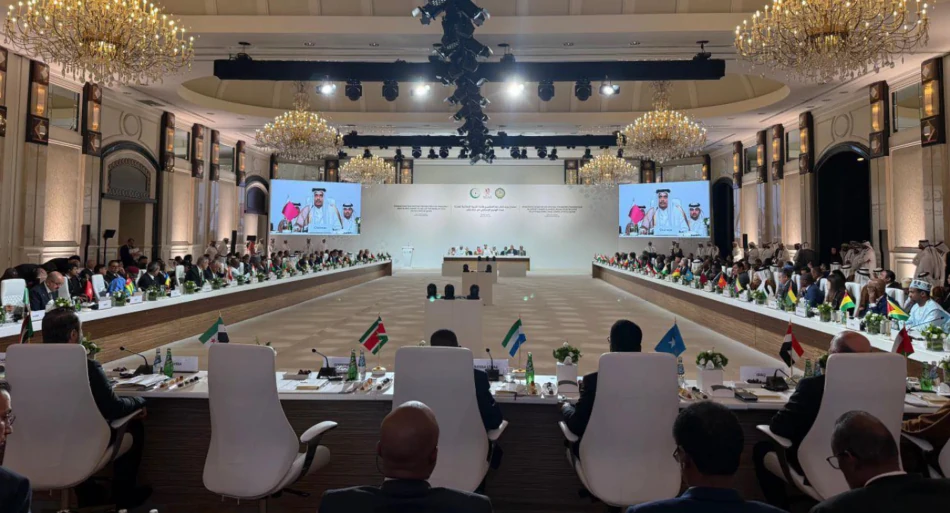
Doha Summit Draft Statement: Aggression Against Qatar Undermines Prospects for Peace
Arab-Islamic Summit Condemns Israeli Strike on Qatar as Attack on Regional Peace Mediation
An extraordinary Arab-Islamic summit has issued a forceful condemnation of Israel's recent attack on a residential neighborhood in Doha, describing it as a dangerous escalation that undermines international peace efforts. The strike, which killed several civilians including a Qatari national, targeted an area housing diplomatic delegations involved in Gaza ceasefire negotiations, marking a significant breach of Qatar's neutrality as a key regional mediator.
The Attack That Crossed Red Lines
The Israeli strike hit a residential district in Doha that housed negotiating delegations participating in Qatar's mediation efforts, alongside schools, nurseries, and diplomatic missions. The draft summit statement described the attack as a "cowardly and illegitimate" assault that resulted in civilian casualties, including the death of a Qatari citizen.
What makes this incident particularly significant is Qatar's role as a neutral mediator in the Gaza conflict. The Gulf state has been working alongside Egypt and the United States to broker ceasefires and facilitate prisoner exchanges between Israel and Hamas. By targeting facilities used for these diplomatic efforts, Israel has effectively attacked the peace process itself.
Regional Response and Diplomatic Implications
Unity Against Escalation
The summit's response reflects broader Arab and Islamic concerns about Israel's expanding military operations beyond Gaza and Lebanon. Foreign ministers from across the region expressed "absolute solidarity" with Qatar, viewing the attack not just as an assault on one nation, but as aggression against the entire Arab-Islamic world.
The statement emphasized that such actions "expose the aggressiveness of the extremist Israeli government" and add to what they termed Israel's "criminal record" that threatens regional and international security.
Impact on Mediation Efforts
The attack represents a fundamental challenge to international diplomatic norms. Qatar has maintained strict neutrality in regional conflicts, making it an effective mediator in disputes involving Hamas, the Taliban, and other groups that Western nations cannot directly engage with. This neutrality has made Doha invaluable to international peace efforts.
By targeting Qatar's territory, Israel has potentially compromised one of the few remaining channels for diplomatic resolution of the Gaza conflict. The summit statement warned that such actions "undermine international mediation and peace-making operations."
Broader Strategic Context
Qatar's Unique Position
Qatar's mediation role extends far beyond the current Gaza crisis. The country has successfully mediated in conflicts from Afghanistan to Lebanon, leveraging its small size and neutral stance to build trust with all parties. This latest attack threatens to undermine that carefully cultivated neutrality.
The summit praised Qatar's "civilized, wise, and responsible" response to the attack, noting the country's commitment to international law and its determination to defend its sovereignty through legitimate means.
Regional Security Implications
The incident occurs against a backdrop of escalating regional tensions, with Israel conducting operations across multiple fronts. The summit's condemnation reflects growing concern that Israel's military actions are expanding beyond immediate conflict zones to target countries attempting to facilitate peace.
This escalation pattern mirrors historical moments when regional conflicts have spiraled beyond their original boundaries, potentially drawing in previously neutral parties and complicating diplomatic solutions.
International Law and Accountability
The summit statement firmly rejected any attempts to justify the attack "under any pretext," emphasizing that it constitutes a "blatant violation of international law and the UN Charter." This legal framing is significant, as it positions the incident within broader discussions about state sovereignty and the protection of diplomatic facilities.
The call for international condemnation and "deterrent measures" suggests that Arab and Islamic nations may pursue formal complaints through international legal channels, potentially including the International Court of Justice or UN Security Council.
Future of Regional Diplomacy
The attack on Qatar raises fundamental questions about the future of regional mediation efforts. If neutral mediators become targets, the prospects for diplomatic solutions to ongoing conflicts diminish significantly. This could force a shift toward more militarized approaches to regional disputes, exactly the opposite of what international peace efforts seek to achieve.
The summit's strong support for Qatar's mediation efforts, despite the attack, suggests that regional powers remain committed to diplomatic solutions. However, the incident has undoubtedly complicated Qatar's position and may require enhanced security measures for future negotiations.
The international community's response to this incident will likely determine whether diplomatic immunity and neutral mediation remain viable tools for conflict resolution in an increasingly volatile Middle East.
Most Viewed News

 Sara Khaled
Sara Khaled






